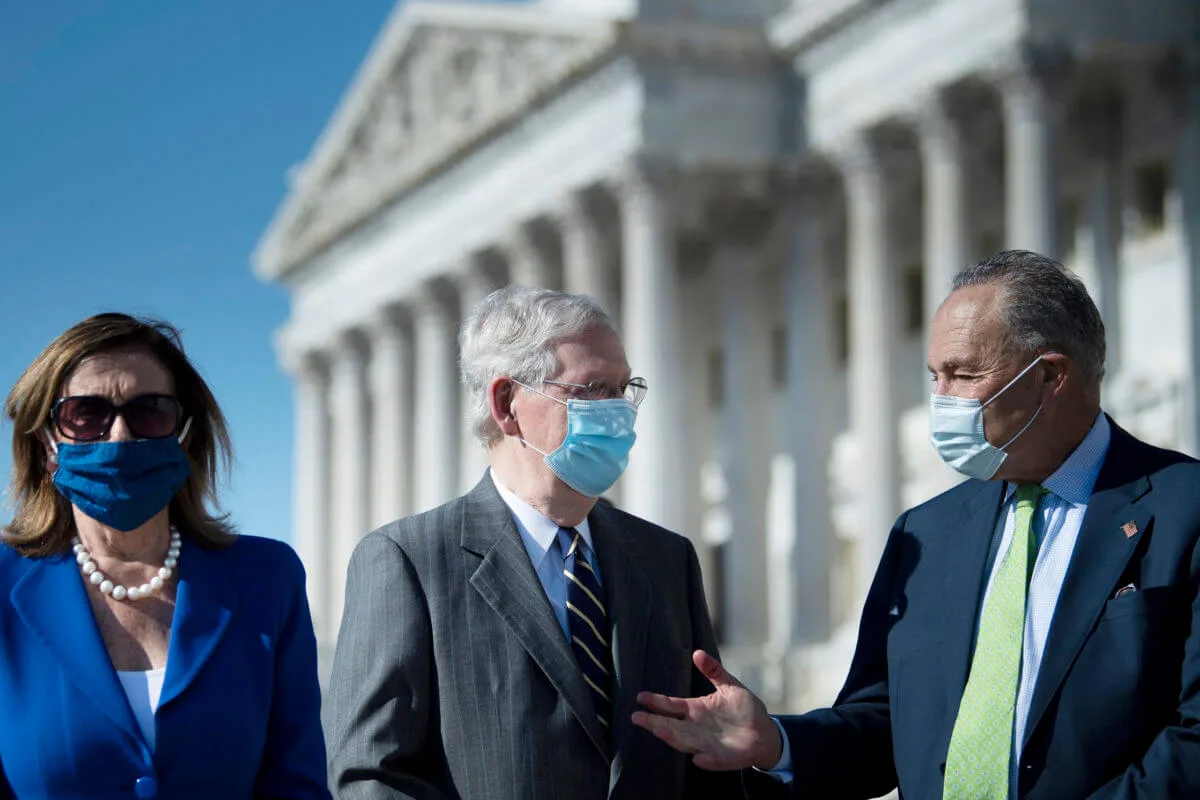
#image_title
Renters, farmers, and rural residents should get a boost from the long-awaited second federal COVID relief package.
Congressional Democrats and Republicans finally reached a deal on a second COVID-19 relief bill over the weekend. While it is being pilloried for including $600 stimulus checks said to be woefully inadequate for millions of struggling families, preliminary details appear to show other parts of the package will help a wide swath of Wisconsinites in the short term.
The agreement, announced Sunday, comes nearly nine months after Congress passed the massive coronavirus legislation known as the CARES Act. With remaining CARES funds set to expire at the end of the year and a number of other provisions, such as a federal eviction moratorium, also coming to a close, continued inaction from federal lawmakers threatened to leave millions of Americans out in the cold.
Congress’ new bill, which is expected to pass early this week, includes about $900 billion in spending, far less than the $2.2 trillion of the CARES Act and the $3 trillion follow-up package Democrats first proposed in May.
“While this isn’t as robust as we need, it at least will provide some immediate assistance for people,” said US Rep. Mark Pocan (D-Town of Vermont) in a Sunday appearance on WISN’s UpFront. “We should have more support for people in general who are unemployed and even for small businesses.”
Earlier: Here Are the Four Previous Deals Reached in the First Weeks of the Pandemic
The $600 stimulus checks are for Americans who made less than $75,000 last year. Also included are an extension of the eviction moratorium through Jan. 31, an additional $300 per week for unemployed Americans, $25 billion for rental assistance, $13 billion for farmers, and $7 billion for broadband access. A comprehensive rundown is available here from Politico.
“It’s positive, it’s needed, it will help,” Colleen Foley, executive director of the Legal Aid Society of Milwaukee, a public-interest law firm, told UpNorthNews.
However, Foley said some of the fixes are Band-Aids rather than long-term solutions. She and 10 other housing experts told UpNorthNews last week that as many as one-third of Wisconsin renters were at risk of eviction without a federal moratorium extension and additional funding. The new relief bill has done little to assuage those fears.
“We’re going to have the same crisis ongoing in the next month,” Foley said.
The $600 one-off stimulus check is just half of what Americans got in March. With the average American household spending over $5,200 per month as of 2019, the $600 check per adult is unlikely to make a lasting impact.
Like the stimulus check, the unemployment insurance boost of $300 per week is half what it was in the CARES Act. The $600 weekly boost expired in July, and President Donald Trump in August signed an executive order to give unemployed people a $300 boost; the funding for Trump’s boost quickly ran out.
Wisconsin farmers, many of whom were already struggling amid record bankruptcies in recent years, are grateful for the financial assistance as the COVID-19-related economic downturn related to the food economy continues, said Darin Von Ruden, president of Wisconsin Farmers Union.
While he would rather see farmers’ income increase through the marketplace than in the form of government handouts, this aid is welcome news given how the pandemic has devastated the agriculture marketplace, said Von Ruden, who farms in rural Westby in western Wisconsin. He noted how one of his neighbors sells cheese made from sheep milk to higher-end restaurants, and with those businesses struggling her sales are down more than half compared to last year.
“More farmers now are selling directly to restaurants, and a lot of them have really suffered through this process,” Von Ruden said.
Rather than sending similar aid amounts to all farmers, Von Ruden said, he would like to see those hurting the most financially receive larger government paychecks.
The additional broadband funding will be welcome in Wisconsin, which is ranked just 30th in the nation for high-speed internet access. The COVID-19 pandemic has exacerbated this issue as many schools switched to either voluntary or mandatory online learning, which not only provides a lower-quality education for students but also puts low-income and rural students at an inherent disadvantage.
Native American tribes nationwide would get $1 billion through the bill, while another $300 million would go to general rural broadband expansion, according to a breakdown of the broadband funding by Axios. Additionally, $250 million would go to the Federal Communications Commission’s telehealth program, and $65 million would improve federal mapping of areas with little or no broadband access.
“Broadband is critical for Wisconsin generally, and especially during the pandemic, so I’m glad that broadband funding is being included in the federal bill,” said state Rep. Mark Spreitzer (D-Beloit), who formerly served on the Legislative Council Study Committee on Rural Broadband.
Spreitzer said the funding for better mapping is especially crucial because the state relies upon federal maps to determine which areas are underserved. Those maps are often inaccurate because they consider an area fully serviced if just one house in a Census block has adequate high-speed access.
“Hopefully this all does get passed in the next couple of days here and we can find out what the details are, but as long as a good chunk of this money ends up coming to Wisconsin, we can certainly put it to use,” Spreitzer said.
A longstanding roadblock to a deal was Republican assistance on giving new legal protections to businesses whose employees contract COVID-19. Pocan said giving that kind of “blanket immunity” to all businesses, even bad actors, would be going too far. He specifically cited incidents with meatpacking plants, which “had people working on top of each other and almost all the employees wind up getting covid. And they knew what they were doing along the way.”
“They wanted to give every corporation immunity for bad behavior and we didn’t want to go down that path; it would set a terrible precedent,” Pocan said. “This isn’t representing your constitutions, the people. It’s representing corporations. Some corporations have been abysmal with COVID and you don’t want to give blanket immunity.”
Julian Emerson and Christina Lieffring contributed to this report.

Medical debt will no longer appear on credit reports for all Americans
This new rule will erase an estimated $49 billion in unpaid medical bills from the credit reports of roughly 15 million Americans, according to the...

Sick of hidden fees on concert tickets and hotel stays? A new federal rule bans them.
Now, live event businesses and hotels must clearly list their prices in both their advertising and pricing information. American consumers on...

Trump’s tariff plan would raise prices and ‘reduce the living standard of Americans,’ economists say
Trump’s plan would effectively be a sales tax that disproportionately harms working-class families and could cause a trade war that hurts US...

Trump’s tariff and tax plan would raise taxes on 95% of Americans, report finds
In response to the report, the Harris-Walz campaign released an analysis of its own, outlining how Trump’s agenda would raise costs for nearly 2.5...




